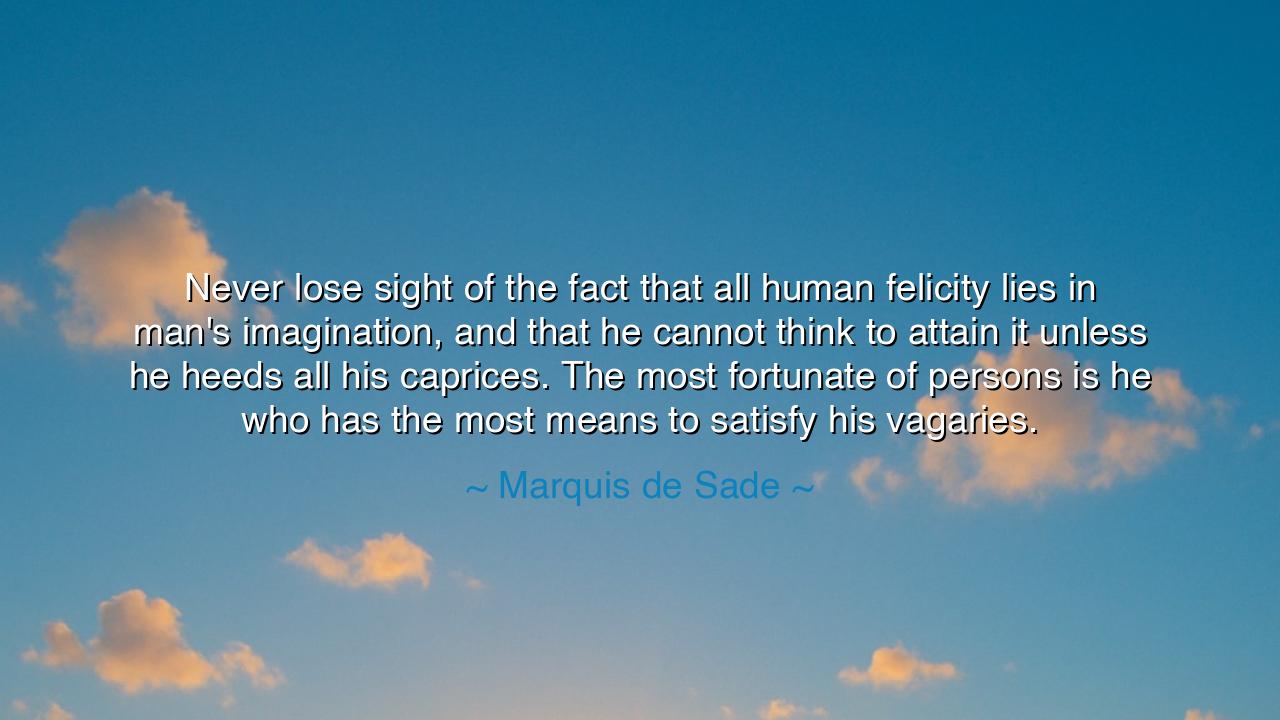
Never lose sight of the fact that all human felicity lies in
Never lose sight of the fact that all human felicity lies in man's imagination, and that he cannot think to attain it unless he heeds all his caprices. The most fortunate of persons is he who has the most means to satisfy his vagaries.






When Marquis de Sade wrote, “Never lose sight of the fact that all human felicity lies in man’s imagination, and that he cannot think to attain it unless he heeds all his caprices. The most fortunate of persons is he who has the most means to satisfy his vagaries,” he was not simply speaking as a philosopher of pleasure, but as a provocateur of the soul. His words, though born in an age of rebellion and reason, reach into the timeless question: Where does true happiness dwell? In this reflection, he declares that felicity—that elusive joy which humankind forever pursues—does not reside in the outer world of wealth, fame, or power, but within the ever-shifting realm of the imagination.
To de Sade, man is not a creature of logic alone, but of passion, fantasy, and desire. He understood that the imagination is the source of both bliss and torment, the wellspring from which all human yearning flows. It is within the mind that the seeds of pleasure are sown and harvested. What the body enjoys, the mind first envisions; what the heart seeks, the imagination shapes. And thus, the caprices—the sudden desires, the fleeting whims, the unexplainable impulses—become sacred, for they are the purest voice of the soul’s longing. In heeding them, man approaches the only happiness he can truly claim as his own.
This was not a comfortable truth in de Sade’s time, nor is it today. His words arose from a century obsessed with reason, structure, and moral restraint—the Age of Enlightenment, when men sought to bind the human spirit to rules of virtue and logic. But de Sade, like a dark mirror to his age, reminded the world that reason alone cannot feed the heart. His was a philosophy that refused to deny the wildness of the human being. To him, felicity demanded freedom—the freedom to imagine without shame, to feel without apology, to follow one’s inner voice even when it leads to chaos or contradiction.
Yet behind his scandalous reputation lies a deeper wisdom: that repression, not indulgence, is the enemy of peace. When a man silences his imagination, when he fears his own desires, he becomes divided against himself. History offers many such figures. Consider the story of Leo Tolstoy, who, though celebrated as a moral philosopher, spent years in torment over his passions and guilt. In denying parts of himself, he found neither holiness nor happiness, only conflict. It was only when he turned inward—toward the truth of his own contradictions—that he began to find harmony. In this, he echoed what de Sade had already declared: that felicity comes not from denial, but from the courage to know and embrace the full scope of one’s inner world.
However, de Sade’s wisdom carries both light and shadow. To heed all one’s caprices without discernment may lead not to freedom, but to destruction. Thus, one must temper imagination with awareness, passion with conscience. The ancients taught this balance: the Stoics spoke of mastering desire, not to extinguish it, but to guide it like a flame within the lamp. De Sade’s words remind us that imagination is the fire of life—but even fire, untamed, consumes what it was meant to illuminate. The art of living lies in knowing when to follow desire and when to hold it in reverent check.
In truth, felicity—the joy de Sade names—is not found in constant indulgence, but in the harmony between dream and reality. To imagine is divine; to act with wisdom upon that imagination is mastery. The most fortunate of persons, as he says, are not those who possess every luxury, but those whose means—whether of wealth, creativity, or courage—allow them to bring their inner visions to life. The artist who paints his dreams, the thinker who shapes new worlds of thought, the lover who follows the heart’s call—all are richer than kings, for they have made imagination flesh.
So let this teaching stand: do not exile your imagination. Do not silence your desires out of fear of judgment or conformity. Let your inner visions breathe, and learn to weave them gently into the fabric of your days. To live without imagination is to live without color; to dream without courage is to waste the miracle of consciousness. But remember, too, that freedom without wisdom becomes ruin. The noble soul walks the narrow path between passion and prudence, between fire and form.
And so, from the paradox of the Marquis de Sade emerges an ancient truth: happiness is born not from the outer world, but from the inner one. To imagine deeply, to honor your desires, to bring them forth with art and understanding—this is the true alchemy of felicity. For in the end, man’s greatest power is not his strength nor his intellect, but his imagination—the eternal kingdom where his spirit reigns sovereign, and where, if he dares, he may create his own paradise.






AAdministratorAdministrator
Welcome, honored guests. Please leave a comment, we will respond soon